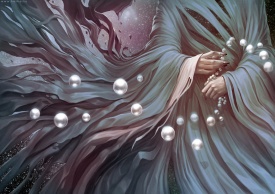| Part of a series on the |
| Culture of Ireland |
|---|
| History |
| People |
| Religion |
| Art |
| Literature |
|
|
Stack Exchange Network. Stack Exchange network consists of 176 Q&A communities including Stack Overflow, the largest, most trusted online community for developers to learn, share their knowledge, and build their careers. Unix & Linux Stack Exchange is a question and answer site for users of Linux, FreeBSD and other Un.x-like operating systems. It only takes a minute to sign up.
Meenlocks were deformed fey that originated from intense fear. They had no purpose other than to destroy good and beauty, and resorted to telepathic torture in order to terrify and corrupt other creatures. Anyone who succumbed to this torture would then be magically transformed into a meenlock as well.1 1 Description 2 Personality 3 Combat 4 Origin 5 Society 5.1 Religion 6 Appendix 6.1. A fetch stands anywhere from 5 to 7 feet tall and weighs between 100 and 250 pounds. Its clothes are tattered and worn with age and exposure. Its rotting flesh is drawn tight around its bones and flushed grayish-white. Its hair is scraggly and frozen and ice crystals cover its skin. A fetch's eyes are stark blue.
A fetch, based in Irish folklore, is a supernatural double or an apparition of a living person. The sighting of a fetch is regarded as an omen, usually for impending death.
Description[edit]
The fetch is described as an exact, spectral double of a living human, whose appearance is regarded as ominous. A sighting of a fetch is generally taken as a portent of its exemplar's looming death, though John and Michael Banim report that if the double appears in the morning rather than the evening, it is instead a sign of a long life in store.[1] As such, it is similar to the Germanic doppelgänger and to some conceptions of the British wraith.[1][2]Francis Grose associated the term with Northern England in his 1787 Provincial Glossary, but otherwise it seems to have been in popular use only in Ireland.
Origins and etymology[edit]

The etymology of fetch is obscure and the origin of the term is unknown. It may derive from the verb 'fetch';[1] the compound 'fetch-life', evidently referring to a psychopomp who 'fetches' the souls of the dying, is attested in Richard Stanyhurst's 1583 translation of the Aeneid and the first edition of the Oxford English Dictionary suggested this usage may indicate the origin of the term fetch.[3]
Accounts of the origin of fetch are complicated by a word faecce, found in two textually-related Old English glossaries, the Corpus Glossary and the First Cleopatra Glossary.[4][5][6]Faecce could in theory be an Old English form of modern English fetch. In the glossaries, faecce is given as a lemma (a word to be glossed); given that most such words in these glossaries are in Latin, it ought to be a Latin word, but no such Latin word is known, leading some scholars to suggest it may by Old Irish. Since it is glossed with the Old English word mære, which denotes female supernatural being associated with causing illness and nightmares, it could be the origin of the Hiberno-Englishfetch.[4] Recent research has not arrived at a consensus on this question.[7][8]
Portents of death not dissimilar to later fetch traditions are found in early Irish literature and are associated with the Old Irish term fáith ('seer'): Fedelm issues prophecies of death in Táin Bó Cuailnge; Cormac Connloinges sees a sinister vision of a woman washing bloody chariot wheels in Bruiden Da Choca; a hag prophecies the death of Conaire in Togail Bruidne Da Derga; and in Cath Maige Tuired, the Mórrigán likewise prophesies death. Similar ideas are also found in the Old Norse idea of the fylgja and these are relevant to understanding Irish tradition because of the importance of the Vikings in Ireland. The fylgja, which in Norse mythology denoted an alter ego, usually in animal form, connected to a person's fate. Unlike the Irish concept, the fylgja is almost always female.[9][10][11] On these grounds, William Sayers has argued that the term fetch originated as a Hiberno-English form of Irish fáith.[12]
Appearances in literature[edit]
Corresponding to its contemporary prominence in 'national superstitions', the fetch appeared in Irish literature starting in early 19th century. 'The fetch superstition' is the topic of John and Michael Banim's Gothic story 'The Fetches' from their 1825 work Tales by the O'Hara Family[13] and Walter Scott used the term in his Letters on Demonology and Witchcraft, published in 1830, in a brief reference to 'his ... fetch or wraith, or double-ganger'.[14]
Patrick Kennedy's 1866 folklore collection Legendary Fiction of the Irish Celts includes a brief account of 'The Doctor's Fetch', in which a fetch's appearance signals death for the titular doctor.[15][16] More recently, 'The Fetch' is the malevolent narrator of Patrick McCabe's 2010 novel The Stray Sod Country, wherein it temporarily inhabits the bodies of the residents of a small Irish town, causing them to commit both psychological and physical harm to themselves and others.[17]
Robert Aickman's 1980 collection of 'strange stories' Intrusions: Strange Tales contains his story 'The Fetch'. In it, the eponymous 'fetch' (actually described as a Scottish Cailleach or 'carlin' (hag)) is a portent of impending death for the Leith family, leaving a trail of loch water behind her. The story has most recently been anthologised in a reprint collection of Aickman's work titled The Wine-Dark Sea (London: Faber, 2014).
Fetch 5e Cat
Appearances in popular culture[edit]
- An adapted version of a fetch appears in the Dungeons & Dragonsrole-playing game in the Monstrous CompendiumDragonlance Appendix.[18]
Notes[edit]
- ^ abc'Fetch, n.2'. Oxford English Dictionary. December 1989. Retrieved 15 January 2011.Cite has empty unknown parameters:
|trans_title=and|coauthors=(help) - ^'Wraith, n. b.'Oxford English Dictionary. December 1989. Retrieved 26 November 2012.Cite has empty unknown parameters:
|trans_title=and|coauthors=(help) - ^'Fetch-life'. Oxford English Dictionary. December 1989. Retrieved 15 January 2011.Cite has empty unknown parameters:
|trans_title=and|coauthors=(help) - ^ abNeville, pp. 106–107.
- ^Taylor, p. 106.
- ^Alaric Hall, 'The Evidence for Maran, the Anglo-Saxon 'Nightmares', Neophilologus, 91 (2007), 299–317 (pp. 301, 313), doi:10.1007/s11061-005-4256-8.
- ^Alaric Hall, 'The Evidence for Maran, the Anglo-Saxon 'Nightmares', Neophilologus, 91 (2007), 299–317 (p. 301), doi:10.1007/s11061-005-4256-8.
- ^William Sayers, 'A Hiberno-Norse Etymology for English Fetch: 'Apparition of a Living Person'', ANQ: A Quarterly Journal of Short Articles, Notes and Reviews, 30:4 (2017), 205-209 (p. 208 fn. 5), doi:10.1080/0895769X.2017.1336073.
- ^Finlay, p. 59 and note 152.
- ^Pulsiano, p. 624.
- ^William Sayers, 'A Hiberno-Norse Etymology for English Fetch: 'Apparition of a Living Person'', ANQ: A Quarterly Journal of Short Articles, Notes and Reviews, 30:4 (2017), 205-209 (pp. 205-6), doi:10.1080/0895769X.2017.1336073.
- ^William Sayers, 'A Hiberno-Norse Etymology for English Fetch: 'Apparition of a Living Person'', ANQ: A Quarterly Journal of Short Articles, Notes and Reviews, 30:4 (2017), 205-209, doi:10.1080/0895769X.2017.1336073.
- ^Connolly, pp. 178–179; note 98.
- ^Walter Scott, Letters on Demonology and Witchcraft (London: John Murray, 1830), vi, 177, cited by William Sayers, 'A Hiberno-Norse Etymology for English Fetch: 'Apparition of a Living Person'', ANQ: A Quarterly Journal of Short Articles, Notes and Reviews, 30:4 (2017), 205-209 (p. 205), doi:10.1080/0895769X.2017.1336073.
- ^Briggs, p. 310.
- ^Kennedy, 'The Doctor's Fetch'.
- ^Schreers, Julia; 'Bedeviled', The New York Times Book Review, pg. BR19, 10 October 2010. https://www.nytimes.com/2010/10/10/books/review/Scheeres-t.html
- ^Rick Swan; Bill Connors; Troy Denning; Bruce Nesmith; James M. Ward; Steve Winter (1990). Mike Breault (ed.). Monstrous Compendium Dragonlance Appendix. TSR, Inc.ISBN0-88038-822-6.
References[edit]
Fetch Emergency
- Oxford English Dictionary. Oxford University Press. 2009.
- Briggs, Katharine Mary (1977). British Folk Tales and Legends: A Sampler. Psychology Press. ISBN0415286026.
- Connolly, Claire (2011). A Cultural History of the Irish Novel, 1790–1829. Cambridge University Press. ISBN1107009510.
- Finlay, Alison (2000). The Saga of Bjorn, Champion of the Men of Hitardale. Hisarlik Press. ISBN1874312265.
- Neville, Jennifer (1999). Representations of the Natural World in Old English poetry. Cambridge University Press. ISBN0-521-64036-9.Cite has empty unknown parameter:
|coauthors=(help) - Pulsiano, Phillip (1993). 'Supernatural Beings'. Medieval Scandinavia: An Encyclopedia. Taylor & Francis. ISBN0824047877.
- Taylor, Richard P. (2000). Death and the Afterlife: a Cultural Encyclopedia. ABC-CLIO. ISBN0-87436-939-8.Cite has empty unknown parameter:
|coauthors=(help)
| Look up fetch in Wiktionary, the free dictionary. |
